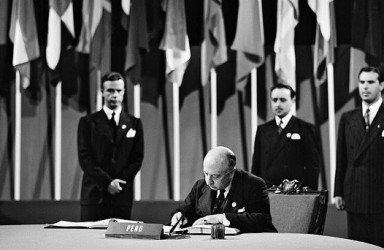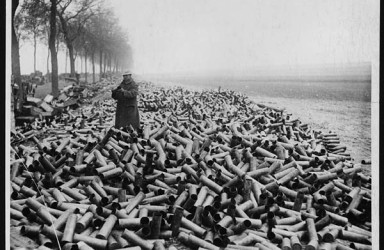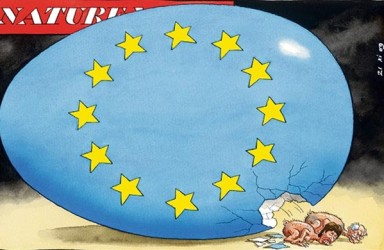Humanitarian Intervention and Ontological Security
A state engages in humanitarian actions not just to show the world that it is compassionate and civil, but rather that it accepts its moral obligation to do so. During times of crises, a state puts its ontological security aside and acts on the needs of the disaster area. This is prevalent in the state’s speech, where it decrees that all of its measures will be acted upon quickly and for the benefit of it citizens. The humanitarian act is not a result of a past shameful action, but rather a pure and compassionate act in which the state undertakes morally
Under what Conditions has the UN been able to use its Chapter VII Powers?
The responsibilities and powers enshrined in Chapter VII of the United Nations Charter are central to the Security Council’s ability to uphold international stability and peace by averting or ending conflicts. So why has the Security Council failed to address a range of major conflicts that have occurred over the past 64 years, although it has successfully dealt with others?
Does Britain bear the primary responsibility for World War I?
The sheer chaos of an era said to have required a daily calendar to catch the sense of rising tension between all the capitals makes it seem nonsensical to ascribe substantial blame to Britain. Eyebrows should rightly be raised over Britain’s non-interventionist policy on the eve of war in 1914, despite unconcealed German desires to be the main protagonist in global affairs. Which role did Britain play in the slide to war?
The Division of Palestine in 1947: Personal Policy or Strategic Interest?
The decision by the United Nations to partition Palestine in 1947 was a major watershed in Middle Eastern history. Not only did it lead to the creation of the state of Israel, a Zionist aim since the eighteenth century, but it set in stone a conflict which still to this day remains unresolved.Although the decision aimed to appease both Jews and Arabs, who laid differing ideological claims to the same territory and, as James L. Ilsley stated, was the ‘best of four unattractive and difficult alternatives,’ it failed.
The Challenges to State Sovereignty from the Promotion of Human Rights
Traditionally, the promotion of Human Rights and the concept of state sovereignty have been fundamentally opposed. The institutionalisation of Human Rights in the international system is a relatively new concept. It wasn’t until after the Second World War that the challenge of Human Rights upon state sovereignty emerged.
Is it possible to democratise the European Union?
Certain dates in European history are taken to be the significant historical events which changed the course of the continent forever. 1648, and the Treaties of Westphalia; 1815, the Concert of Europe; 1945 the end of the Second World War and 1989, the fall of Communism – these are the events that are attributed to the makeup of modern Europe. But what of the years 1957, 1992, and 2009?
Human Security and the Plight of Europe’s Roma Population
Given the severity of the discrimination and prejudice suffered by Europe’s Roma minority, defining government’s role was key to further understanding the challenges faced by Roma and how they live in a perpetual state of crisis as relates to human security. The question of Roma is a thorn in the eye of Europe, not only for Roma but for a region that cannot afford such human insecurity amongst its population
Amazon Battle: Is hydropower the new Kobayashi Maru?
The Belo Monte and the Madeira Dams have been subjected to criticism due to their negative impacts on indigenous populations of the Xingu and Madeira River. Besides threatening the livelihood of indigenous communities, the projects also have significant negative impacts on the environment. This nevertheless remains a popular option among policy-makers.
Conflict and Cooperation over International Rivers: A Global Governance Proposal
Rivers are an important source of water for the majority of the world’s people. It is impossible to imagine a world that functions without enough water for everyone, and in which major rivers are being rapidly depleted. This paper will outline the current governance of international rivers.
Treaties and the Federal Balance in an Era of Globalization
All states are currently facing the challenges and opportunities of globalization. As countries become more integrated, it behoves them to coordinate laws and policies. Consequently, the boundary between domestic and foreign policy is weakening.This paper employs an institutional focus to explain why globalization has different impacts on federations.











